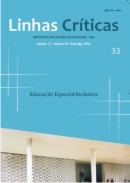Curriculum and diversity: the challenges of the inclusion of school students with intellectual disabilities
DOI:
https://doi.org/10.26512/lc.v17i33.3734Keywords:
Curriculum, School inclusion, Intellectual disabilitiesAbstract
This paper reports aspects of a study aimed at analyzing the curriculum of a public school, under the administration of the municipality, in the city of Natal/RN, with the purpose of verifying if the curriculum has aspects of inclusion for students with intellectual disabilities. Based on a case study, we present some reflections on the conceptions of the curriculum, from the perspective of school inclusion. For this end, we emphasize the understanding of teachers, coordinators and the principal about the insertion of this theme in the pedagogical-policy project and the conception of the curriculum, as well as the curriculum guidelines, as expressed in the pedagogical-policy project. We found that the official curriculum guidelines express a broad vision of the curriculum, but are unknown to the professionals of the educational institution.
Downloads
References
ALVES, Zélia Maria Mendes Biasoli; SILVA, Maria Helena, Galvão Freitas Dias da. Análise quantitativa de dados de entrevista: uma proposta. Paidéia, Ribeirão preto, v. 2, p. 61-69, 1992.
ARAÚJO, Suêldes de. O caminho das pedras para gestão escolar: o papel do gestor na implementaçãodo projeto político-pedagógico. 2008. 187 p. Dissertação (Mestrado em Educação) ”“ UniversidadeFederal do Rio Grande do Norte, Natal, 2008.
FONSECA, Marília; TOSCHI, Mirza Seabra; OLIVEIRA, João Ferreira de (Org.). Escolas gerenciadas: planos de desenvolvimento e projetos político-pedagógicos em debate. Goiânia: Ed. da UCG, 2004.
GIL, Antonio Carlos. Métodos e técnicas de pesquisa social.3. ed. São Paulo: Atlas, 1999.
GOLDENBERG, Mirian. A arte de pesquisar: como fazer pesquisa qualitativa em ciências sociais. 7. ed.Rio de Janeiro: Record, 2003.
KRAMER, Sônia. Propostas pedagógicas ou curriculares: subsídios para uma leitura crítica. In:MOREIRA, Antonio Flávio Barbosa (Org.). Currículo: políticas e práticas. 9. ed. São Paulo: Papirus, 2006.
LIBÂNEO, José Carlos. Organização e gestão da escola: teoria e prática. 5. ed. Goiânia: Alternativa, 2004.
MOREIRA, Antonio Flávio Barbosa (Org.). Currículo: políticas e práticas. 9. ed. São Paulo: Papirus, 2006.
PACHECO, José Augusto. Escritos Curriculares. São Paulo: Cortez, 2005.
PORTER, Gordon. Organização das escolas: conseguir o acesso e a qualidade através da inclusão. In:AINSCOW, Mel; et al. Caminhos para as escolas inclusivas. Lisboa: Instituto de Inovação Educacional,1997. p. 33-48.
SACRISTÁN, J. G. O currículo: uma reflexão sobre a prática. Trad. Ernani Rosa. 3. ed. Porto Alegre:Artmed, 2000.
SANTOS, Lucíola Licínio de Castro Paixão. Identidades docentes em tempo de educação inclusiva. In:VEIGA, Ilma Passos Alencastro; AMARAL, Ana Lúcia (Org.). Formação de professores: políticas edebates. 3. ed. São Paulo: Papirus, 2006, p. 155 - 174 (Coleção Magistério: Formação e Trabalho Pedagógico).
SASSAKI, Romeu Kazumi. Inclusão:construindo uma sociedade para todos. Rio de Janeiro: WVA, 1997.
SCHENEIDER, Magalis Bésser Dorneles. Subsídios para atuação pedagógica no cotidiano escolar inclusivo. Disponível em: <http://www.educacaoonline.pro.br/art_subsidios_para_acao.asp>. Acesso em: 2 fev. 2004.
TORRES GONZÁLEZ, José Antonio. Educação e diversidade: bases educativas e organizativas. Porto Alegre: Artmed, 2002.
Downloads
Published
How to Cite
Issue
Section
License
Copyright (c) 2016 Linhas Críticas

This work is licensed under a Creative Commons Attribution 4.0 International License.
Authors who publish in this journal agree to the following terms:
-Authors maintains the copyright and grants the journal the right of first publication, the work being simultaneously licensed under the Creative Commons Attribution License which allows the sharing of the work with recognition of the authorship of the work and initial publication in this journal.
- Authors are authorized to enter into additional contracts separately, for non-exclusive distribution of the version of the work published in this journal (eg publish in institutional repository or as a book chapter), with acknowledgment of authorship and initial publication in this journal.
-Authorers are allowed and encouraged to publish and distribute their work online (eg in institutional repositories or on their personal page) at any point before or during the editorial process, as this can generate productive changes as well as increase the impact and the citation of published work (See The Effect of Free Access).



